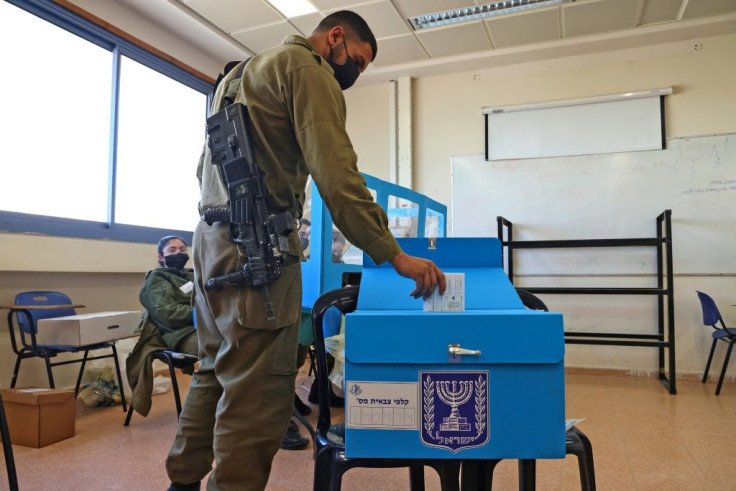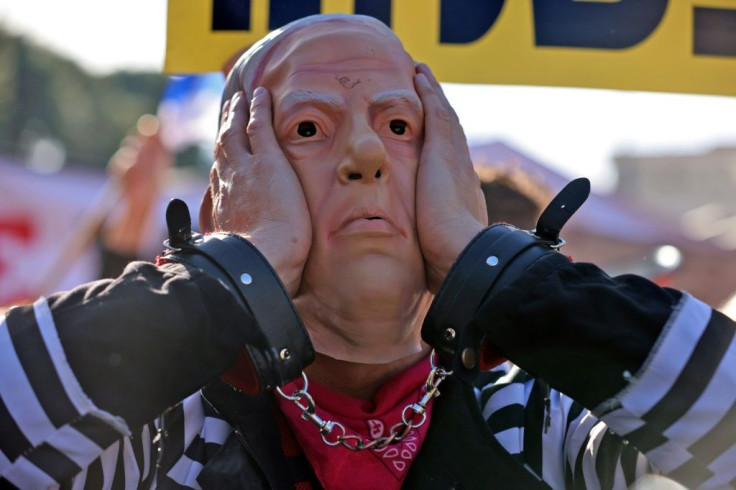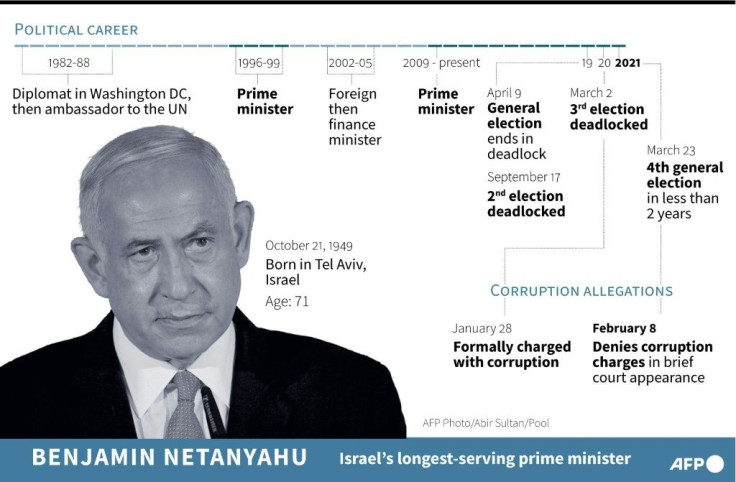Israel's Netanyahu On Trial As Coalition Talks Ramp Up
Israel's legal and political dramas converged Monday, as Prime Minister Benjamin Netanyahu faced court in his corruption trial while his bid to form a government after another inconclusive election entered a critical phase.
The 71-year-old premier -- who last month contested his fourth election in less than two years -- was met at the courthouse by protesters who taunted him as "crime minister."
Israel's first premier to be indicted while in office was ordered to appear in person at Jerusalem's district court for opening arguments, indicted on charges of bribery, fraud and breach of trust.

As court proceedings got underway, President Reuven Rivlin held talks to determine which party leader has the best chance of forming a government following March 23 elections.
Israel remains mired in the worst political crisis in its 73-year history, with voters and the 120-member parliament bitterly divided over whether Netanyahu deserves to extend his record tenure of 12 consecutive years.
Netanyahu's right-wing Likud party finished first in the polls, winning 30 seats, but his path to a 61-seat absolute majority is precarious.

The anti-Netanyahu camp, however, lacks a clear leader, is ideologically divided and will struggle to forge a working majority.

Netanyahu sat in court as lead prosecutor Liat Ben-Ari told judges that the premier was involved in "a serious case of government corruption".
He is accused of accepting improper gifts and seeking to trade regulatory favours with media moguls in exchange for positive coverage -- allegations which he denies.
Ben-Ari charged that Netanyahu had "made illegitimate use of the great governmental power entrusted to him," in his dealings with media executives "in order to advance his personal affairs".

In an unscheduled address hours after the hearing had ended, Netanyahu insisted it was the prosecution that abused its office.
"This is what a coup attempt looks like," he said, lashing out at state prosecutors supervised by Attorney General Avichai Mandelblit, a Netanyahu appointee.
Netanyahu left the court, with its consent, before the prosecution called its first witness, the former chief editor of the Walla news site, Ilan Yeshua.

Prosecutors accused Netanyahu of helping the site's owners, Shaul and Iris Elovitch, strike multi-million-dollar deals in exchange for direct influence on articles.
Yeshua testified that he received constant instructions from Netanyahu's allies to post articles favourable to the premier and information that smeared his rivals.
"It was clear that we were a website that did what the prime minister's office asked us," Yeshua told the court.

Yeshua testified that a key target of Netanyahu's smear campaign was Naftali Bennett, the prime minister's estranged former protege, who now leads the religious nationalist Yamina party.
Netanyahu is now urging Bennett to back him as prime minister.
Rivlin met with party officials throughout the day.
If custom holds, he will give the leader with the most recommendations from individual lawmakers up to six weeks to form a government.
When Rivlin's consultations ended on Monday, Netanyahu had the highest number of recommendations at 52, with the backing of Likud, the two ultra-Orthodox Jewish parties and the far-right Religious Zionism alliance.
Former television presenter Yair Lapid, whose centrist Yesh Atid party finished second in the election, earned 45 recommendations, including his party's 17 seats plus the votes of several smaller ideologically diverse parties opposed to Netanyahu.
Yamina, as expected, used its seven seats to endorse Bennett for prime minister.
Things can shift until Rivlin assigns a mandate.
Seeking to forge unity in the anti-Netanyahu camp, Lapid said he had offered Bennett "the opportunity to form a government with me...in which he could serve first in the (prime ministerial) rotation between us."
Lapid said Netanyahu's "reckless performance" attacking the court proved the prime minister was "dangerous" and "tough decisions" were required to remove him.
Likud defector Gideon Saar's New Hope party declined to recommend anyone, as did the mainly Arab Joint List and the conservative Islamic party Raam, led by Mansour Abbas.
Abbas has emerged as an unparallelled figure in Israeli political history: an Arab and Muslim leader who says he is open to joining an Israeli government that works to improve the lives of Arabs.
His four parliament seats could decide whether either camps secures a majority. He told Rivlin he would negotiate with whoever gets the mandate.
Rivlin, whose acrimony for Netanyahu is well-known, will be closely watched over the coming days.
He has indicated he may not be guided by mathematics alone and could assign the mandate to the candidate "who has the best chance of forming a government".
Rivlin's office said a decision would be made on Tuesday.
If Netanyahu and his rivals both fail to form a government, a fifth election within months is possible.
© Copyright AFP 2024. All rights reserved.











